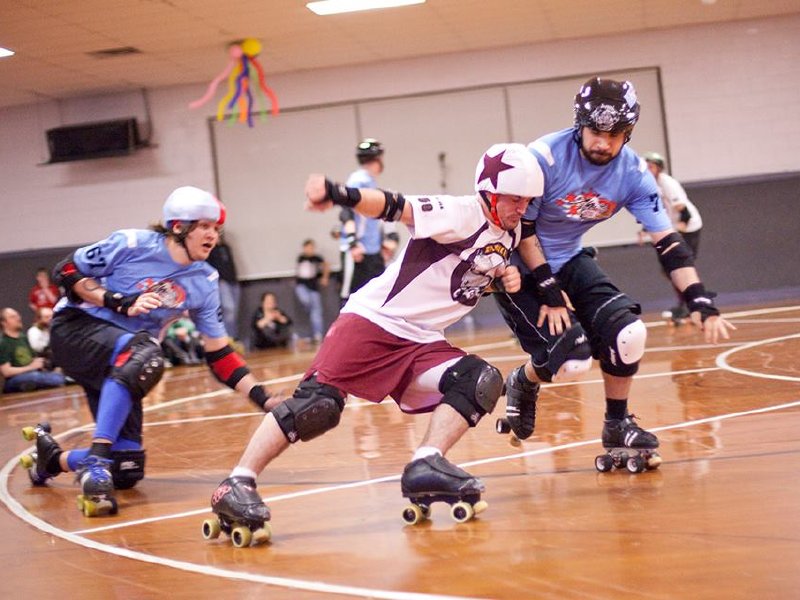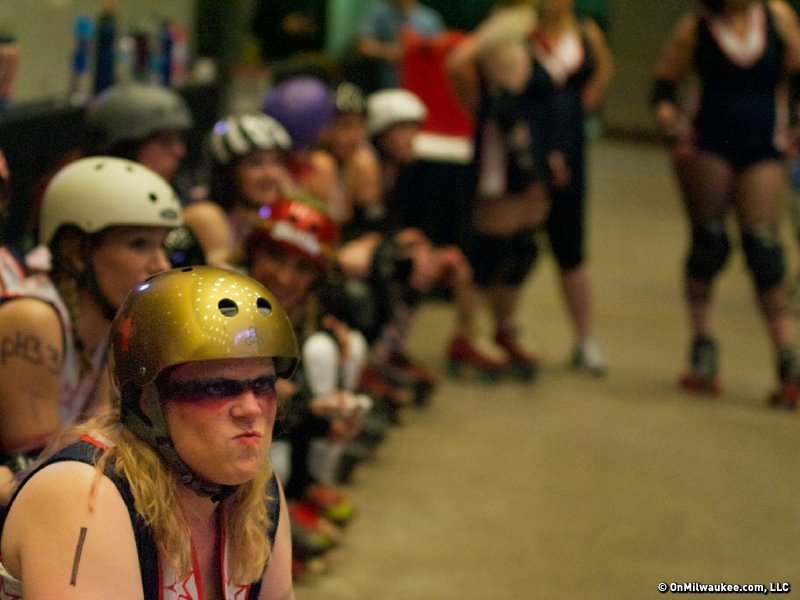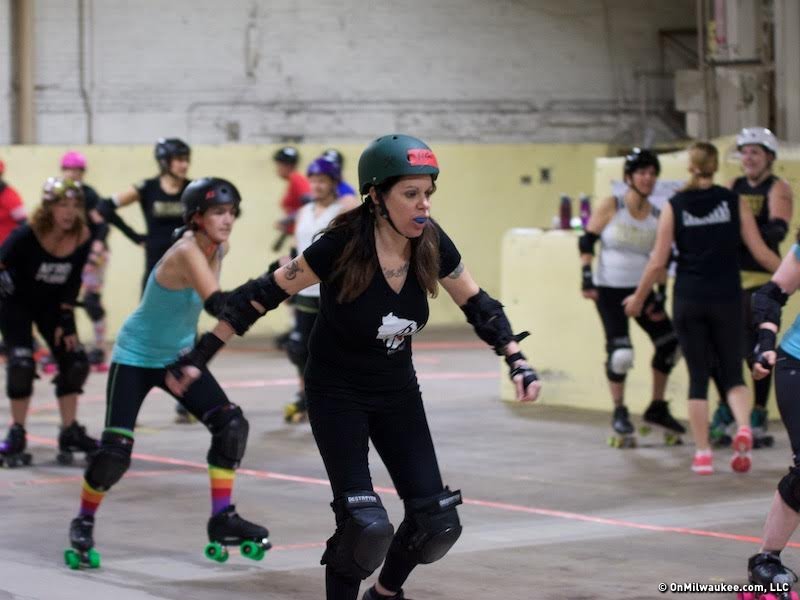The whistle blows. Two men with big stars on the sides of their helmets charge toward a scrum of both allies and opponents. The former wants the team’s star-marked roller skater to break through the mess of limbs and bodies; the latter would prefer if he got body-checked into oblivion.
Eventually, one of the two starred players breaks his way through the strategic clump of people. He’s home free for now, but in a few seconds or so, he'll work his way around the track, and there will be another wall of humans – with nicknames like Braaainz and Roadblock-Ed – to work around. This time, for points.
This is roller derby. The sport found new pop cultural life in the early '00s thanks to a few women's derby teams down in Austin, Tex. and came to Milwaukee in 2005 in the form of the Brew City Bruisers. And now, the Milwaukee Blitzdkrieg are here to show roller derby isn't just for the ladies in town anymore.
"We’re really trying to let people know we’re here, show them what men’s roller derby is and grow the roller derby scene in Milwaukee," said Lemme Adam (aka Adam Herbage off the track). "We’re not looking to promote the Blitzdkrieg; we’re looking to promote derby."
The Blitzdkrieg – originally called the Milwaukee Schlitzkrieg until copyright issues forced a change – started back in mid-2009 by some referees for the Brew City Bruisers and some of the Bruisers’ husbands. Adam joined in 2011 after a chance trip to a Bruisers' game.
"I saw them in the championship for a friend’s birthday, and I was telling my girlfriend, ‘You should do this! This is awesome! If there was a men’s team, I’d be all over that,’ Adam recalled.
"Five minutes later, the announcer came on and said the Blitzdkrieg was recruiting, and I was like, ‘Oh sh*t.’ I put my money where my mouth is and went to a practice. The next day, I went out and bought all my skates and gear."
Progress for the team was slow at first, but over its short life, the Blitzdkrieg has grown significantly. Over the next several years, the team picked up more and more players for its roster, and in 2012, it applied and became one of 43 members of the Men’s Roller Derby Association (MRDA).
The association includes, among others, the New York Shock Exchange, Southern Discomfort and Your Mom (laugh all you want at that final name, but the Des Moines-based team is your current reigning MRDA champion).
The team is completely volunteer-run – including the players – and travels mostly around the Midwest for its minimum five MRDA matches a season, competing against teams in Chicago, Green Bay, Indianapolis and Minnesota.
For the 2014 season, however, the Blitzdkrieg’s main focus is on its newly created home teams: the Half Barrel Heroes and the Great Lakes Pirates, who have their first head-to-head bout on Saturday, March 29 at 10 a.m. at Rollaero in Cudahy. See, each team in MRDA is like a league in itself, containing multiple home teams that play against each other. They don’t count as MRDA matches, but they provide other crucial benefits.
"The point is that we can put on local events easier," Adam said. "We don’t have to coordinate with Chicago or Green Bay or whoever, find the accommodations and all that stuff. And it gives the newer guys an opportunity to play and develop if they haven’t made the travel team. We’ve got this opportunity to have this inner rivalry where we can get our friends and family in, and they can cheer for their boys, no matter what level they’re on."
Having more local bouts also means having more opportunities to hopefully gain some fans and dispel some of the popular misconceptions about what roller derby really is in the process.
"People think it’s this ’70s, WWE-style spectacle where we’re throwing these fake elbows and getting into fake fights," Adam said. "It really is athletic, and it really is coming into its own as a sport."
"When women's derby first came out, it was fake to a point," said Swillham (aka Bill Johnson), one of the team's non-skating officials. "It was a show. Nowadays, that's all been cut out. The guys and the girls who do this do it because they love it."
The sport works like this: There are two 30-minute periods in a bout, and each period is made up of brief two-minute segments called jams. Each team fields four blockers and one jammer (the guys with the stars on their helmets). When the whistle blows, the jammers push and race their way through the blockers, and the first one to get completely past all of the blockers on the track is the lead jammer. He now has control over the length of the jam, which he can stop early for strategic reasons.
From that point forward, the jammers gain a point for each opponent passed up. Think of it like a NASCAR race in which cars gain a point for each fellow racer passed up, and the opponent race cars join together to strategically create walls and barricades.
"And there’d be a bigger element of bumper cars and demolition derby," Adam joked.
There are other rules, strategies and penalties as well, but the important things to note are that the bouts are fast and furious, and they’re no stranger to injuries like tweaked knees, concussions, bloody noses and bruised bones. Even with all the carnage though, there’s mutual respect amongst all of the players. After all, none of them are getting paid to play; in fact, they pay to play, having to buy their own skates and gear. They’re there for the fun and competition of the sport.
"I did four years in the Army and got out of shape," said Stud Lightyear (aka Rich Slemp), who joined the team last July. "I tried other sports – club football, softball, this, that and the other – but everything was based on people drinking. There was no real competitiveness. I showed up here for a practice, and the first thing I saw was Hijack nailing someone, sending them several feet across the track. Right there, I was sold."
Part of the reason for roller derby’s increasing popularity is its inclusivity. Men and women of all shapes and sizes cannot only play roller derby, but thrive. A small 120-pound skater can have great value as a nimble jammer, while a heavier-set skater can make for a terrific blocker.
Even previous skating skill level is no matter. When they first join, many of the players have to be taught how to skate, or at least how to skate up to the level of competition. Adam noted that many players start off slowly making their way across the track, grabbing on the rails. No matter their learning curve, however, the team and its supporters bring them on.
"Derby is a really great community," Adam said. "It’s all skater owned, and it’s kind of a misfit community. The people who didn’t play sports in high school tend to get into it a lot or people who don’t really have another physical outlet. There are a lot of like spirits."
"This is where we all kind of come to cut loose," Lightyear said. "Some people go to the bar and drink. Some people do pool leagues. We smash into each other at high speeds."
As much as it is a gigantic cliché to say that one has always had a passion for film, Matt Mueller has always had a passion for film. Whether it was bringing in the latest movie reviews for his first grade show-and-tell or writing film reviews for the St. Norbert College Times as a high school student, Matt is way too obsessed with movies for his own good.
When he's not writing about the latest blockbuster or talking much too glowingly about "Piranha 3D," Matt can probably be found watching literally any sport (minus cricket) or working at - get this - a local movie theater. Or watching a movie. Yeah, he's probably watching a movie.







